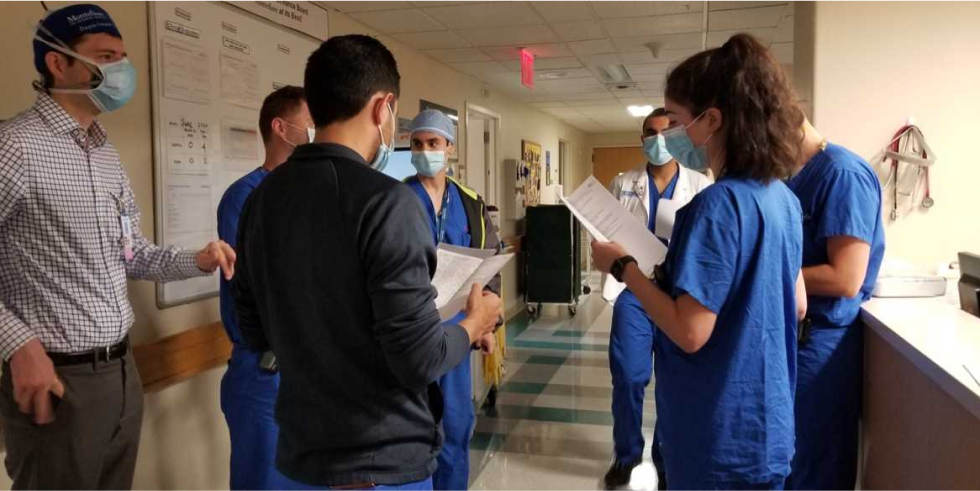Care Personalized to Every Patient
Care Personalized to Every Patient
Pelvic Floor Disorders (PFDs) refer to specific problems with the urinary bladder or reproductive organs, such as urinary incontinence, pelvic organ prolapse and female sexual dysfunction. These disorders can negatively impact quality of life, and many are highly treatable.
The Female Pelvic Medicine and Reconstructive Surgery (FPMRS) Division and Center for PFDs at Montefiore Einstein provide state-of-the-art diagnosis and therapy for women with PFDs.
The Center for PFDs provides comprehensive clinical care including diagnostic testing, surgery and non-surgical management. Advanced diagnostic testing, such as multichannel video urodynamics and cystourethroscopy, are performed conveniently on site.


Compassionate Expert Care for a Broad Spectrum of Pelvic Floor Disorders
We provide patient-centered care to hundreds of women each year affected by disorders of the pelvic floor. The Female Pelvic Medicine and Reconstructive Surgery Division has fellowship-trained surgeons from both gynecology and urology, and offers minimally invasive (vaginal, robotic and laparoscopic) surgical options, offering care for the following conditions:
- Bladder pain syndrome or interstitial cystitis
- Fecal incontinence
- Female sexual dysfunction (desire/arousal disorders, pain with intercourse)
- Fistulas involving the vagina or urinary tract
- Menopausal disorders
- Neurogenic bladder (in both men and women)
- Overactive bladder syndrome (frequent urination, urinary urgency, nocturia)
- Pelvic organ prolapse (vaginal bulge)
- Postpartum pelvic floor disorders (birth trauma)
- Sensory and emptying abnormalities of the bladder
- Urinary incontinence (urine leakage)
We Provide a Complete Range of Treatment Options
We perform complex surgeries including procedures for stress urinary incontinence, pelvic organ prolapse, reconstructive procedures (including fistula repair, urethral diverticulectomy), and management of mesh complications.
The Female Pelvic Medicine and Reconstructive Surgery Division also offers a range of management options for patients with incontinence and overactive bladder syndrome, including OnabotulinumtoxinA (Botox), sacral neuromodulation, and percutaneous tibial nerve stimulation.
When needed, we collaborate with pelvic floor physical therapists and colorectal surgeons to provide the best possible care to all patients.

Improving Care Through Continued Research
The Female Pelvic Medicine and Reconstructive Surgery (FPMRS) Division works closely with research scientists to develop innovative treatment strategies and to deepen understanding of the underlying mechanisms of pelvic floor disorders.
We participate in several nationally funded grants to better learn more about the pathophysiology of pelvic floor disorders, including bladder pain syndrome and overactive bladder syndrome.
Our clinical research projects are wide-ranging and include disparities in FPMRS care, applications of telemedicine in FPMRS, use of mobile technology in the management of fecal incontinence, association of frailty with pelvic floor dysfunction and more.
By publishing our findings in peer-reviewed journals, we are continuing to help redefine the highest standards of care.

Committed to Educating Medical Students, Residents and Fellows
Our center fosters a collaborative approach, providing the ideal environment for trainees to be exposed to all areas of diagnosis and treatment of pelvic floor disorders.
Our division supports the Female Pelvic Medicine and Reconstructive Surgery fellowship accredited by the American Board of Obstetrics and Gynecology and the American Board of Urology.

To inquire about a Pelvic Floor Disorders consultation, call:


The Department of Urology at Montefiore Einstein provides the most current therapies and treatments available for urologic care. From addressing general urology needs to comprehensive multidisciplinary cancer care, we treat each patient as an individual within a comfortable setting.


 Back to Top
Back to Top 718-944-3838
718-944-3838


